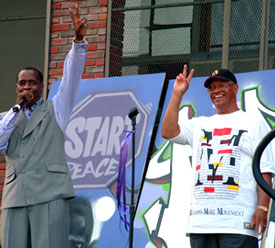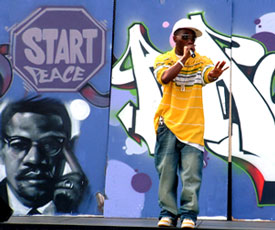
(FinalCall.com) – Activists in Boston, Mass. say they are fed up with the street violence: More than 200 people have been shot this year, almost 20 percent more than in 2003, when the streets were quiet.
“We have no choice now. We have to get into the streets,” argues Captain True C. Allah, head of the Fruit of Islam at Boston’s Muhammad’s Mosque No. 11, and a former street gang-member.
He said the Nation of Islam had the credibility in the streets and the trust of many of the young people who were looking for a way out from the recent violence. “The peace rally was a beautiful event, but it was the beginning of our process to bring peace to the streets of Boston,” the youthful captain admitted.
“Since the start of May, there have been three victims of gunfire every two days,” stated a July 6 story in The Phoenix entitled “The guns of Boston.” The story goes on to note that overall crime is down in the city.
USA Today, in their July 10 edition, stated that Minneapolis, Milwaukee, Washington, D.C. and Boston were all reporting spikes in juvenile crime. “In Washington and Boston, police say there have been alarming increases in robberies by juveniles,” the paper states. In Boston, according to USA Today, weapons arrests involving youths “rose 103 percent.”
Boston police officials blame the recent violence totally on so-called street gang activity.

The website www.gunguys.com mentions a new study from the Terry Sanford Institute of Public Policy at Duke University, published in the summer issue of the Journal of Policy Analysis and Management, as a possible marker for what is happening in Boston.
“Gun prevalence has a more-or-less neutral effect on other crimes, including assault and robbery,” the study’s authors write.
“Criminal justice researchers talk about supply-and-demand solutions for reducing gun prevalence in violent areas. But at least for now, cities like Boston will have to focus on the demand side, because the availability of cheap, black-market guns is not going away any time soon,” concludes the article.
“The problem here is guns,” stated Boston City Councilor Michael Ross, chair of a Special Committee on Youth Violent Crime Prevention that issued a report in the first week of July.
“All of that sounds good, but most of that is an over-simplification of the problem,” argues Reverend William Dickerson, of the Greater Love Tabernacle Church, a rally participant. “The violence is inevitable when we as a society ‘x’ God out of our lives,” he stressed.
“The poverty levels and the economic recession have caused people to look to other means for sustenance,” he added. “Boston’s educational system is in a shambles, which is causing a lot of our youth to drop out of school. And we must get back to the village raising the child. We need real parenting.”
Rev. Dickerson also said that young Black males are locked out of the economic system in Boston. “They don’t know how to navigate through the maze, and the problems here are systemic,” he said.
Capt. Allah says that the recent rally got the attention of many of the youth. “We made some inroads, especially in the Cape Verdean community,” he said. “They are listening to the message that the Teachings of the Honorable Elijah Muhammad hold the key to the problems that Black people face in Boston today.”












